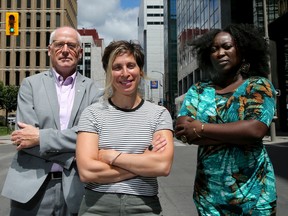We all need to better understand what happened, learn from what was a traumatic experience for thousands of people, and commit to the changes necessary to prevent a repeat.

article content
Many in Ottawa are likely tempted to leave behind the chaos that descended on the city in February after the “Freedom Convoy” trucks rolled into town. But for communities left upside down, it’s not that simple. When the Rolling Thunder motorcycles arrive or when the protesters return for Canada Day, many relive the agony of honking horns and hateful taunts they endured during those three long weeks, and are terrified it will happen again.
Announcement 2
article content
Far from putting it behind us, we all need to better understand what happened, learn from what was a traumatic experience for thousands of residents, and commit to the changes necessary to prevent it from happening again. That’s why the Ottawa People’s Commission on Occupying Convoys, launched in late June, is so important. We are honored to have been asked to serve as the three commissioners who will lead this important process and hear firsthand from people about their experiences. Hearings will be held in the fall, but written submissions can be received at any time.
Some may wonder why such a commission is necessary. After all, a special parliamentary committee has been holding hearings for three months and the Public Order Emergency Commission, overseen by Ontario Court of Appeal Judge Paul Rouleau, is underway. Both are legally required because the federal government invoked the Emergencies Law.
Announcement 3
article content
But the parliamentary committee has been dominated by questions about whether Public Security Minister Marco Mendicino misled parliament about police agencies asking the government to invoke the law. And Judge Rouleau’s mandate is limited to assessing whether the Trudeau government’s unprecedented decision to use the Emergencies Act meets the strict legislated criteria.
In addition, the Ottawa City Auditor General is conducting an “independent evaluation of the city’s response to the convoy protest.” That review, also limited in scope, will include only two “virtual public consultations” of two hours each, scheduled for Tuesday and Wednesday of this week, and an online survey that will be open until the end of July.
Announcement 4
article content
Each of the above reviews is necessary and welcome. What has become clear, however, is that little attention is being paid to a genuine understanding of the far-reaching and devastating impact that the trucking occupation had on the safety, health and well-being of the people who live and work in the neighborhoods that were taken over. for the convoy.
An honest and comprehensive understanding of what happened at the community level is essential to any assessment of how governments responded to the protest. That assessment, in turn, should shape the institutional, legal, political, and operational reforms that need to be adopted in the future.
Over the next several months, our goal is to hear from hundreds of people who will share deeply personal accounts of hurt and fear, as well as remarkable resilience, solidarity, and community support. Some we can hear them individually, others in community meetings and other settings. Some will be public, others private. We will work hard to ensure that the space for people to show up is welcoming, respectful, and safe. We will strive to reach out and build trust with people whose experiences have been overlooked to date. We will give people the time they need and the respect they deserve.
ad 5
article content
Our work will be guided, very simply, by human rights. Indeed, in many respects, the People’s Commission itself is a human rights requirement that ensures that marginalized groups have an opportunity to be heard and influence legislative and political reform.
The commission fervently defends the right to peaceful protest. All three of us certainly do. It is a cornerstone of our democracy, essential to upholding all other human rights, and is of particular importance to people and communities traditionally excluded from power.
The right to protest must, at the same time, respect other crucial rights, including equality, the right to be free from racism, homophobic and transphobic hatred, discrimination and misogyny, and to be protected from acts or threats of violence. The right to protest must also not interfere with the enjoyment of fundamental rights such as access to food, health care and peaceful coexistence in one’s own home.
Some may see that as setting limits or restrictions on what protesters can do. We don’t see it that way. Instead, we see the right to protest as an integral part of protecting human rights as a whole, the rights of everyone. That is what this commission will explore.
Commission progress, details on how to introduce yourself and share your expertise, and invitations to contribute to our work, are available at www.opc-cpo.ca.
Leilani Farha, alex snow Y Debbie Owusu-Akyeeah they are the commissioners of the Ottawa People’s Commission on the Occupation of the Convoy.

